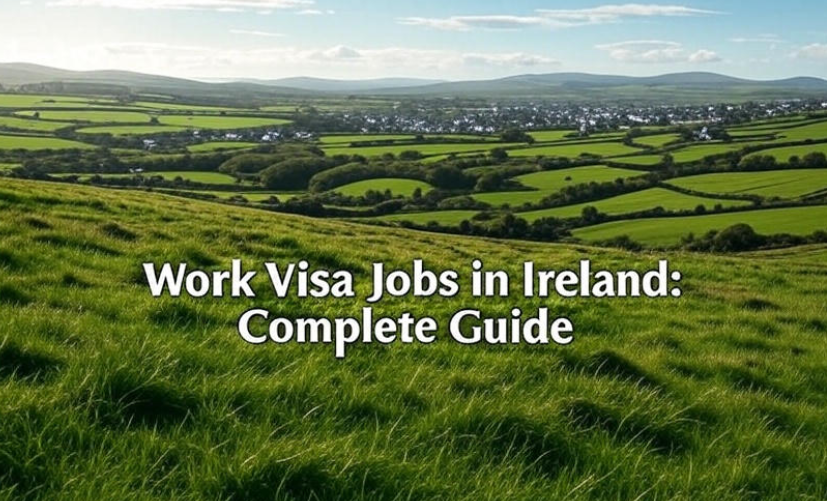The job market in Ireland is unique. Several sectors grow fast each year—hospitality, retail, technology, healthcare support, and customer service. Ireland’s economy depends a lot on service industries, which naturally create many jobs that don’t always require prior experience.
Companies here also believe in “on-the-job training.” So instead of demanding everything upfront, they prefer to train new workers once they join. This opens doors for students, newcomers, and career changers.
Popular industries for beginners
Some sectors are more beginner-friendly than others. If you want to start working without experience, here are the fields you should look into:
-
Hospitality and Tourism 🍽️ – Hotels, cafes, and restaurants are always hiring staff for waitressing, bar work, housekeeping, and reception.
-
Retail 🛒 – Big supermarkets and clothing chains like Dunnes Stores, Tesco, and Penneys often hire sales assistants and cashiers without strict experience.
-
Customer Support ☎️ – Call centers and online companies look for people with good communication skills. Training is usually provided.
-
Healthcare Assistance 🏥 – Roles like healthcare assistants or support workers sometimes require only short courses, not years of work history.
-
Logistics and Delivery 🚚 – Courier services, warehouses, and delivery apps often need drivers and packers.
Examples of jobs you can get without experience
To make it clearer, here’s a small table with examples of actual entry-level jobs in Ireland:
| Job Title | Industry | Requirements | Starting Pay (Approx.) |
|---|---|---|---|
| Sales Assistant | Retail | Friendly attitude, basic maths | €11 – €13 per hour |
| Waiter/Waitress | Hospitality | Customer service skills | €11 – €14 per hour |
| Call Center Agent | Customer Support | Good English speaking skills | €12 – €15 per hour |
| Delivery Driver | Logistics | Driving license (if needed) | €12 – €16 per hour |
| Healthcare Assistant | Healthcare | Short course, caring nature | €13 – €17 per hour |
| Warehouse Operative | Logistics | Physical stamina | €11 – €14 per hour |
How to apply when you have no experience
Here’s the tricky part. Employers know you don’t have experience, but they still want to see potential. How do you show that?
-
Highlight soft skills – Things like communication, teamwork, punctuality, and willingness to learn matter a lot.
-
Talk about part-time work or volunteering – Even babysitting, tutoring, or helping at a local event counts.
-
Show flexibility – Employers love when you’re open to working different shifts.
-
Customize your CV – Don’t just send the same CV everywhere. Adjust it to fit each job description.
The role of networking
In Ireland, networking matters more than many people realize. A lot of entry-level jobs never even get advertised online. Instead, they are filled through word of mouth or referrals. So it’s important to talk to people, join community groups, or attend job fairs.
Sometimes, a simple chat with someone in a café can lead to a new opportunity. That’s just how things work here.
The minimum wage and income expectations
When you’re starting out without experience, you’re likely to be offered jobs close to minimum wage. But the good news is, Ireland has one of the highest minimum wages in Europe.
Here’s a quick look:
| Age Group | Minimum Hourly Rate (2025 approx.) |
|---|---|
| 20 years and over | €12.70 |
| 19 years old | €11.43 |
| 18 years old | €10.16 |
| Under 18 | €8.89 |
Many entry-level jobs actually pay a little more than the minimum wage, especially in cities like Dublin and Cork where living costs are higher.
Work-life balance in beginner jobs
One of the underrated aspects of starting your career in Ireland is work-life balance. Most companies respect working hours, especially in retail and hospitality. Shifts are usually well-defined, and overtime is often paid.
For students or part-timers, employers are flexible with schedules, making it easier to balance studies and work.

Challenges you may face
It’s not all easy. Getting a job without experience also comes with challenges:
-
Competition is high in big cities like Dublin.
-
Some roles may offer short-term or seasonal contracts.
-
Physical jobs like warehouse or hospitality can be tiring.
But with persistence, most people find their way into something stable within a few months.
Tips for international job seekers 🌍
If you’re moving to Ireland from another country, here are a few extra tips:
-
Make sure your English CV fits Irish style (short, clear, 2 pages max).
-
Mention your language skills—many companies value bilingual staff.
-
Apply on popular Irish job boards like Jobs.ie, IrishJobs.ie, and Indeed.ie.
-
Check visa requirements before applying. Some entry-level jobs may require work permits.
A day in the life of an entry-level worker
Let’s take an example. A sales assistant at a clothing shop in Dublin might:
-
Open the store with the team at 9 AM
-
Help arrange clothes and stock shelves
-
Assist customers with sizes or returns
-
Take a short lunch break
-
Continue serving until closing time
It’s not complicated, but it does require energy, patience, and people skills.
Future growth opportunities
The beauty of starting small is that you can grow quickly. Many managers in retail or hospitality began as sales assistants or waiters. In customer service, you can move from agent to team leader within a year or two if you show dedication.
Ireland values loyalty. If you stick with a company and keep learning, you’ll be rewarded with better pay and promotions.
Final thoughts
Starting your career without experience in Ireland is not impossible. In fact, it’s more common than you might think. Every year, thousands of people begin their working lives here through entry-level jobs.
Yes, the pay might be modest at first. Yes, it can be tiring sometimes. But it’s also a golden opportunity to build your future, gain local experience, and grow in confidence.
FAQs about entry-level jobs in Ireland
Q1: Can I get a job in Ireland without any experience at all?
Yes, many sectors like retail, hospitality, and customer service hire beginners with no prior work history.
Q2: What is the average salary for entry-level jobs?
On average, between €11 and €14 per hour depending on the industry and city.
Q3: Do I need perfect English to work in Ireland?
No, but basic English is important, especially for customer-facing roles. Some jobs like warehouse or cleaning may require less English.
Q4: Can students work entry-level jobs?
Yes, students can work part-time during studies and full-time during holidays.
Q5: How long does it take to find a beginner job?
It depends on location and season, but usually between 1–3 months with active applications.




